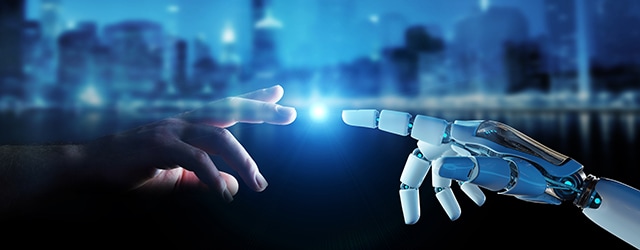Automation both destroys jobs and puts a premium on the jobs that only people can do.

Sooner rather than later, robotic automation and artificial intelligence (AI) will pervade our lives. We can already find them in everyday devices like smartphones and refrigerators; and they are being applied across a broad range of industries, such as banking, finance, accounting, logistics, human resources, medicine, manufacturing and farming. What does this mean for workers in these industries? The answer is not straightforward.
Many studies focus on the threat posed by automation to low-skilled, routine jobs. Bruegel, a Brussels-based economic think tank, estimated in 2014 that 54% of jobs, on average, in EU countries over the coming decades—largely in low-wage, low-skilled sectors—would be lost to machine learning, AI and robotics, with similar estimates, for the US.
Gad Levanon, chief economist for North America at The Conference Board, says we can expect to see more clerical, office-support, call-center, sales and retail jobs automated in the next few years. Some of the job losses in the retail sector will be mitigated by increases in the number of drivers and warehouse workers needed as online sales grow, he anticipates.
An example is Cambodia’s large clothing and footwear sector. Suan Yong Foo, senior expert at the Monetary Authority of Singapore, working in the AMRO ASEAN+3 Macroeconomic Research Office, notes in an essay on an AMRO blog that automation threatens many of the 600,000-plus jobs held by workers who are “struggling to move on from sewing machines to much newer, more advanced, but also more technology-intensive machines.”
Still, at present, robots are not always the most cost-effective option. “Over the next five to 10 years, sewing machine operators—accounting for two-thirds of garment workers—will likely remain more cost-effective than sewing robots,” a 2018 report from the African and Asian development banks, the European Bank for Reconstruction and Development and the Inter-American Development Bank concludes.
With employers increasingly focused on automation and smarter devices, one would expect computer programmers to be in high demand; but it’s not a given. In the future, software algorithms may be able to program other algorithms, so not as many programmers may be needed, says Natalia Nikolova, director of the advanced MBA program at the University of Technology Business School in Sydney, Australia.
There’s another side to the coin, however: While automation and new technologies take jobs, they also create new ones. In the agricultural sector, drones are being employed for mapping, herding and crop spraying; and more-sophisticated farming machinery may do more of the labor-intensive work once done by humans. But new jobs are likely to be created in areas such as precision farming, intensifying demand for data and analytics and “bioinformatics” that use advanced computer systems to analyze biological data. And in health care, robots are expected to complement rather than replace humans, by connecting doctors remotely with patients, for example.
In this context, talking about traditional crafts and trades may seem odd; but we could see renewed emphasis on high-touch skills such as baking or custom carpentry— and handmade goods will command top prices. “I believe ‘Made by Humans’ labels will adorn our most special creations one day,” said Federico Marchetti in a recent Wired UK talk. Marchetti is the founder of online fashion retailer Yoox, which is using AI to personalize mass-market shopping online. “Customers, especially the luxury clients, will seek out the human touch and will pay a premium for it,” he said. “This will be the ultimate expression of luxury’s human-machine balance.”
However, preserving the right balance between human and machine will require us to make more deliberate, conscious choices to assign tasks to one or the other, says Marchetti. “It’s not a choice to stop technology … but it’s a choice to stop ourselves from allowing technology to replace what we truly value,” he explained in his Wired talk. “‘Human’ will be a choice.”



